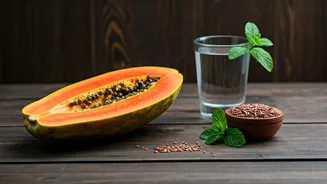Hydration is Key
The cornerstone of managing constipation starts with proper hydration. The BDA emphasizes the critical role water plays in softening stools, thereby facilitating
their smoother passage through the intestines. Individuals often struggle with inadequate fluid intake. It is recommended to consciously increase your daily water consumption. This includes drinking water throughout the day, and also consuming water-rich foods. Dehydration can worsen constipation, making stools hard and difficult to pass. By ensuring sufficient fluid intake, one can significantly mitigate constipation symptoms and enhance overall digestive function. Hydration also supports other bodily functions, making it a fundamental element of a healthy lifestyle beyond just managing constipation.
Meal Rhythm Matters
Establishing a regular meal schedule is another pivotal aspect of the BDA's guidance. The timing of meals influences the body's digestive processes, and regular patterns can help regulate bowel movements. This involves eating at consistent times each day, as this helps to train the body's natural rhythms. Skipping meals or erratic eating habits can disrupt these processes, leading to constipation. Proper meal planning, including the types and timing of foods consumed, plays a vital role. Proper meal plating also affects one's digestive process by creating a proper balance of nutrients. The BDA advises to create a balanced meal. Following a consistent meal routine not only helps to normalize bowel function but also boosts overall digestive health, ensuring that the body functions optimally.
Natural Laxatives Abound
Incorporating natural laxative foods into the diet is a crucial strategy. The BDA spotlights several food groups known for their ability to promote bowel movements. These foods are rich in compounds that assist in easing constipation. High-fiber foods like fruits, vegetables, and whole grains should be a part of your daily intake. Certain fruits, such as prunes and kiwis, are especially effective, owing to their high fiber and natural sugar content. Adding seeds like flaxseed and chia seeds to meals is another easy way to increase fiber intake. These foods work by adding bulk to the stool and making it easier to pass. This approach offers a gentle, natural way to relieve and prevent constipation.
Fiber Goal: 30 Grams
Achieving the 30-gram fiber target set by the BDA is a critical long-term strategy. Fiber acts like a natural cleanser in the digestive system. A diet deficient in fiber is often a leading cause of constipation. Increasing fiber consumption aids in the bulk formation of stools, making them easier to pass and alleviating strain. Reaching the 30-gram goal requires a conscious effort to include high-fiber foods in daily meals. This could involve incorporating whole-grain cereals, legumes, and plenty of fruits and vegetables. Gradually increasing fiber intake, while simultaneously increasing water consumption, minimizes digestive discomfort. Meeting the fiber target helps in regulating bowel movements and promoting long-term digestive health.














